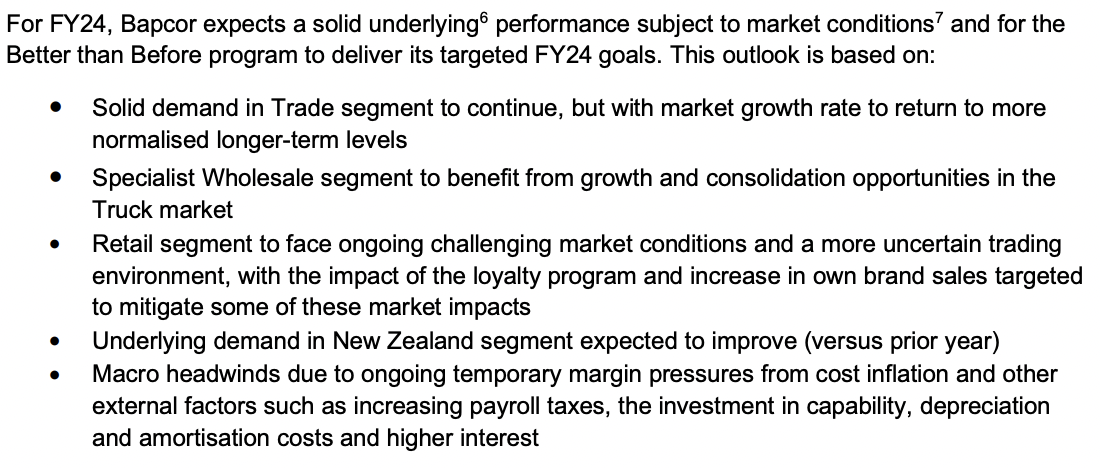Bapcor (ASX:BAP): Still recovering from 3 profit downgrades in less than a year, but could it be destined for better times?

We last wrote about Bapcor (ASX:BAP) in late May, nearly 12 months to the day it had just seen a 3rd profit downgrade in less than a year, and its CEO-elect walk away two days before he was meant to start. As a consequence, its shares took a massive hit. Talk about a crappy run.
Things looked to be going…OK-ish. After all shares gained 20% between May 2024 and July 23, 2025. There was hope that the company was destined for better times? But the brief flame was snuffed out after the latest trading update in which it told investors to brace for a ‘pro forma’ profit 15% below the year before.
Who is Bapcor (ASX:BAP)?
Bapcor sells and distributes vehicle parts, accessories, automotive equipment and services and solutions in Australia, New Zealand and Thailand. It is best known for its Autobarn stores, of which there are 130 in Australia, along with other brands, including ABS and the Shock Shop.
The pandemic presented a mixed bag for the company. Although its stores were forced to close to retail customers, it could still provide vehicle servicing and repairs for trade customers who could still do business, and these accounted for 80% of its business. In FY21, it made a $130m profit, up nearly 40% from the year before. Nonetheless, shipping costs increased and backlogs emerged, causing the company to bulk up on inventory. But enough about ancient history.
A promise of gold, but a delivery of multiple downgrades
In FY23, Bapcor made $2bn in revenue (up 9.7%) and a profit of $125.3m. It paid a record dividend of 22c per share, representing nearly 60% of its profit. At the time, it told investors the following:

Source: Company
Barely two months later (in October 2023), the company held its AGM and told investors the year had not been working out as it had planned, warning of short-term margin pressures from cost inflation, increasing payroll taxes, depreciating costs and interest rates. It told investors its profit was behind expectations, although the shortfall was only in the ‘mid-single digit millions of dollars’.
Another three months later (in January 2024), it gave a trading update and unveiled a preliminary profit of $53-54m, behind the previous year’s $62m profit by 13-15%. It told investors it had taken actions to deliver savings to address cost inflation.
A CEO leaving 2 days before he started
Before we get to the third downgrade, we observe that Paul Dumbrell was due to start as CEO on May 1. On the morning before, the company told investors he ‘has made a personal decision not to join the company’. And so interim CEO Mark Bernhard continued on.
Did Dumbrell pull out because he was aware of what was going on (including the forthcoming downgrade)? Only those who have spoken to him could know for sure, although media reports suggested that he had been speaking to suppliers, ex-Bapcor staff and industry executives. Specifically, ex-CEO Darryl Abotomey told the AFR as such, although stopped short of linking these to his decision to pull out.
Three times a “charm”?
And just one day after Dumbrell was meant to join (on May 2, 2024), Bapcor revealed its profit for the second half of FY24 would be below the first half of FY24’s figure (which was ultimately $54.2m). And so it expected a full year profit of $93-97m. But even this was predicated on the assumption that May and June were historically the strongest trading months, even though the company noted consumers were cutting back on spending. Once again, it told investors it was working to reduce the cost base, but investors are seemingly impatient for results.
To add insult to injury, The Australian reported that private equity firms had been eyeing Bapcor off after earlier downgrades, but had now given up. Again, the company told investors the long-term outlook was good, but investors would not believe any more until they would see.
FY25 proving better?
The company reported FY24 results 6 weeks into FY25. Its loss came in at $253.1m post-tax, although it made a pro-forma profit of $94.8m. Its revenue was $2bn, up 0.8% and EBITDA came in at $268.4m (down 10%). It paid out 15cps, representing a 54% payout ratio. Investors were told total revenues for the first 5 weeks were up 7.7% overall and 1% on a like for like basis.
One day after its result, former 7-Eleven CEO Angus McKay jumped ship and joined Bapcor as CEO and Executive Chair following 8 years with the former company. McKay addressed investors for the first time at the company’s AGM in August and said the dual role would improve accountability and the speed of decision making.
He said the decision to join the company was for reasons including the company’s employees, its market position and healthy financials. Despite the inferior bottom line, its revenue had grown year on year since 2014, and the balance sheet was healthy. Moreover, he also announced that it turned down a $5.40 per share offer from Bain Capital.
In 1H25, the company delivered $987.3m, up 0.3% and a pro-forma profit of $45.5m, down 15.2%. Revenues were boosted by the trade segment, but the retail and specialist wholesale segments were weaker, particularly in New Zealand.
Although its $132.5m EBITDA figure was down 7.2% from 1H24, it was up 6.2% from 2H24 following cost reduction initiatives. It paid out 8cps, representing 60% of its pro-forma profit. The only guidance given was for $20-30m of cost savings.
In late April, Bapcor bought investors together again for a strategy update. McKay boasted the company had a big opportunity with a growing car market by 2% per year up to CY28 as well as the average car age growing. This would lead to steady demand for aftermarket parts and servicing. Again, it gave no guidance for FY25 other than its $20-30m cost savings.
The hope has been snuffed out
The company released unaudited results for FY25, telling investors to expect a pro-forma profit of $81-82m, down 15% from the year before. Its statutory profit would be $31-34m following $48-50m in write-offs including inventories, changes in accounting estimates and uncollectible receivables.
Turning to the top line, it expected a 1.4% decline with all segments down by over 3% except Trade sales which were up 1.4%. Sales in May and June, usually the two busiest months, had been disappointing relative to expectations.
It singled out the retail segment and New Zealand as being two tough segments. To be fair, it is not the only company struggling due to Aotearoa’s basketcase economy. Investors failed to be calmed by Angus McKay’s assurances that the company was taking action to simplify in its operations including closing or moving more than 45 sites.
Adding insult to injury, 3 directors quit in one day – Mark Bernhard, Brad Soller and James Todd. Never a good sign.
So, what now for Bapcor shareholders?
We said back in May that the only thing certain about Bapcor is that it will need to deliver in its $20-30m cost reduction target in FY25. And it doesn’t look like it.
Investors want to see that it is walking the walk so far as its cost-cutting program and long-term outlook are concerned. Long story short, keep an eye on this stock, but steer clear from buying this stock for a little while longer.
What are the Best ASX Stocks to invest in right now?
Check our buy/sell tips

Blog Categories
Get the Latest Insider Trades on ASX!
Recent Posts
Objective Corporation (ASX:OCL) is a superb ASX 200 tech stock
Objective Corporation (ASX:OCL) is one of a kind. There are few companies with a 2-decade listed life without raising a cent…
AI-Media Technologies (ASX:AIM): Investors at panicking that it’ll be a victim of AI
AI-Media Technologies (ASX:AIM) is not the only ASX stock with investors panicking that AI will make it go the way…
Geopolitics, AI, and Energy, The Three Pillars of Investment Growth in 2026
Investing right now feels riskier than ever – messy geopolitics, the AI boom, and power shortages are all piling on.…


